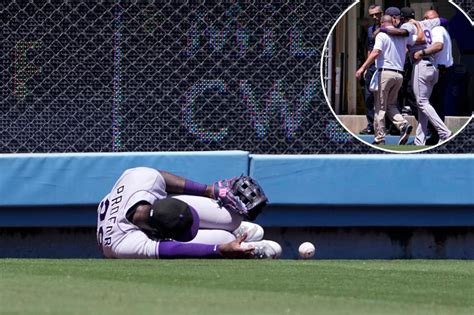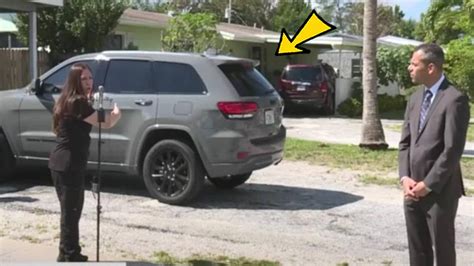
A man struck by falling debris at Dodger Stadium in late May alleges that Los Angeles Police Department officers questioned him about his immigration status instead of focusing on the incident, according to his lawyer.
Dodger Stadium Debris Victim: Cops Asked About Immigration First
A man injured by falling debris at Dodger Stadium on May 26 claims Los Angeles Police Department (LAPD) officers prioritized questions about his immigration status over addressing the incident and his medical needs, his attorney confirmed this week. The incident occurred during a game against the Colorado Rockies.
According to a claim filed against the city of Los Angeles, the victim, identified as Jose Mejia, was hit by a piece of falling metal that detached from an overhead structure. Mejia sustained injuries, including a concussion, and experienced significant emotional distress due to the alleged insensitive handling of the situation by the responding officers.
Mejia’s attorney, Christian Contreras, stated that the officers’ line of questioning immediately following the incident focused on Mejia’s legal status rather than his well-being. “Instead of asking him how he was doing or offering assistance, they immediately started asking him about his immigration status,” Contreras said. “This is completely unacceptable and demonstrates a disturbing lack of empathy and professionalism.”
The claim alleges that the officers’ actions violated Mejia’s rights and caused him additional trauma. It seeks compensation for medical expenses, lost wages, and emotional distress. The claim is a precursor to a potential lawsuit if a settlement cannot be reached.
The LAPD has not yet released an official statement regarding the allegations. However, legal experts suggest that such questioning, if proven, could raise serious legal and ethical concerns. The incident has sparked outrage among immigrant rights advocates and has reignited the debate about the role of local law enforcement in immigration matters.
“This is a clear example of how immigration enforcement can interfere with public safety and erode trust between law enforcement and the community,” said Maria Rodriguez, a spokesperson for the Coalition for Humane Immigrant Rights (CHIRLA). “When victims of crime are afraid to come forward because they fear being targeted for their immigration status, it undermines the entire justice system.”
According to the claim, Mejia was attending the game with his family and was seated in a section of the stadium when the incident occurred. The falling debris reportedly struck him on the head, causing him to fall to the ground. Witnesses at the scene described a chaotic situation, with people scrambling for safety.
“It was terrifying,” said one witness who requested anonymity. “We heard a loud crash, and then everyone started screaming. I saw the man fall, and it was clear he was seriously hurt. I couldn’t believe that the first thing the police asked him about was his immigration status.”
The incident has also raised questions about the safety and maintenance of Dodger Stadium. The stadium, which is one of the oldest in Major League Baseball, has undergone several renovations in recent years, but concerns about its aging infrastructure persist.
“Dodger Stadium is a beloved landmark, but it’s also an old stadium,” said sports analyst Robert Thompson. “The Dodgers organization has a responsibility to ensure that the stadium is safe for fans. This incident raises serious questions about whether they are doing enough to maintain the facility and prevent accidents like this from happening.”
Following the incident, the Dodgers organization issued a statement expressing their concern for Mejia’s well-being and stating that they are cooperating with authorities in the investigation. “The safety of our fans is our top priority, and we are taking this matter very seriously,” the statement read. “We are working closely with the LAPD and other relevant agencies to determine the cause of the incident and to ensure that it does not happen again.”
The Mejia case comes amid heightened tensions over immigration policy in the United States. The Trump administration’s policies, which prioritized immigration enforcement and expanded the scope of deportations, have been widely criticized by immigrant rights advocates. While the Biden administration has reversed some of these policies, concerns about the treatment of immigrants by law enforcement persist.
“The fact that this happened in Los Angeles, a city that prides itself on being a sanctuary for immigrants, is particularly troubling,” said immigration attorney Elena Garcia. “It sends a message that even in places where immigrants are supposed to be protected, they are still vulnerable to discrimination and abuse.”
The claim filed by Mejia’s attorney seeks to hold the city of Los Angeles accountable for the alleged misconduct of the LAPD officers. It also calls for a review of the LAPD’s policies and training procedures to ensure that officers are properly trained to handle incidents involving immigrants.
“We hope that this case will serve as a wake-up call for the LAPD and other law enforcement agencies,” said Contreras. “They need to understand that their job is to protect and serve all members of the community, regardless of their immigration status. Asking about someone’s immigration status when they’ve been injured is not only insensitive but also potentially illegal.”
The incident has prompted calls for increased oversight of the LAPD and other law enforcement agencies. Some advocates are calling for the creation of an independent civilian review board to investigate complaints of police misconduct.
“We need to have a system in place to hold police officers accountable for their actions,” said civil rights activist James Williams. “The current system is not working. Too often, officers are allowed to get away with misconduct, and victims are left without recourse.”
The Mejia case is likely to add fuel to the ongoing debate about the role of local law enforcement in immigration enforcement. Some jurisdictions have adopted policies that prohibit local police from cooperating with federal immigration authorities. These policies, known as sanctuary policies, are intended to protect immigrants from deportation and to encourage them to report crimes without fear of being targeted for their immigration status.
“Sanctuary policies are essential for protecting the rights of immigrants and ensuring public safety,” said Rodriguez. “When immigrants are afraid to interact with law enforcement, it makes it more difficult to solve crimes and keep communities safe.”
However, critics of sanctuary policies argue that they undermine federal immigration laws and make it more difficult to deport dangerous criminals. They argue that local police should be allowed to cooperate with federal immigration authorities to ensure that these criminals are removed from the country.
“Sanctuary policies are a threat to public safety,” said former ICE Director Thomas Homan. “They protect criminals and make it more difficult for law enforcement to do their job.”
The Mejia case highlights the complex and often contentious issues surrounding immigration enforcement in the United States. It also raises important questions about the role of local law enforcement in protecting the rights of all members of the community, regardless of their immigration status.
The legal claim filed by Mejia is currently under review by the city of Los Angeles. If the city does not offer a settlement, Mejia’s attorney has indicated that he will file a lawsuit. The lawsuit would seek damages for medical expenses, lost wages, emotional distress, and other costs associated with the incident.
“We are confident that we will be able to prove that the LAPD officers acted inappropriately and violated Mr. Mejia’s rights,” said Contreras. “We are committed to fighting for justice for Mr. Mejia and holding the city of Los Angeles accountable for its actions.”
The outcome of the Mejia case could have significant implications for the LAPD and other law enforcement agencies. It could also influence the ongoing debate about immigration enforcement and the role of local police in immigration matters. The case serves as a stark reminder of the challenges facing immigrants in the United States and the importance of protecting their rights.
The investigation into the incident at Dodger Stadium is ongoing. The LAPD is reportedly reviewing the actions of the officers involved and is expected to release a statement in the coming weeks. The Dodgers organization is also conducting its own investigation to determine the cause of the falling debris and to prevent similar incidents from happening in the future.
The incident has sparked a broader discussion about the safety and maintenance of public venues. Some experts are calling for increased inspections and stricter regulations to ensure that these venues are safe for the public.
“Public venues have a responsibility to ensure the safety of their patrons,” said safety expert Michael Davis. “They need to have comprehensive safety plans in place and to regularly inspect their facilities to identify and address potential hazards.”
The Mejia case is a complex and multifaceted issue that touches on a wide range of legal, ethical, and social concerns. It is likely to remain in the news for some time to come as the investigation continues and the legal proceedings unfold. The case serves as a reminder of the importance of protecting the rights of all members of the community and ensuring that law enforcement officers are held accountable for their actions.
Further Context and Analysis
The case of Jose Mejia highlights a persistent tension in American society concerning the intersection of local law enforcement and federal immigration policies. While many jurisdictions strive to foster trust with immigrant communities, incidents like this erode that trust and can have far-reaching consequences.
The LAPD, like many police departments across the country, has faced scrutiny regarding its interactions with immigrant populations. Critics argue that even seemingly routine inquiries about immigration status can deter immigrants from reporting crimes or cooperating with investigations, ultimately undermining public safety.
The concept of “sanctuary cities” or jurisdictions with similar policies aims to address this issue by limiting the involvement of local law enforcement in federal immigration enforcement. The goal is to create an environment where immigrants feel safe interacting with police without fear of deportation.
However, opponents of sanctuary policies argue that they hinder the ability of law enforcement to remove dangerous criminals from the country. They contend that cooperation between local and federal authorities is essential for effective immigration enforcement and public safety.
The Mejia case adds a new layer to this debate by raising questions about the appropriateness of immigration inquiries in situations where the primary focus should be on providing medical assistance and investigating a potential safety hazard. The allegations against the LAPD officers suggest a potential violation of professional standards and ethical conduct.
Moreover, the incident underscores the importance of addressing infrastructure maintenance and safety in public venues like Dodger Stadium. While the stadium has undergone renovations, the falling debris suggests that further attention is needed to ensure the safety of fans and prevent future accidents.
The legal claim filed by Mejia’s attorney represents a significant step toward seeking accountability for the alleged misconduct and obtaining compensation for the injuries and emotional distress suffered by Mejia. The outcome of the case could have implications for the LAPD’s policies and training procedures, as well as the broader debate about immigration enforcement and the role of local law enforcement.
The case also highlights the need for greater transparency and oversight of law enforcement agencies. Independent civilian review boards and other mechanisms can help ensure that police officers are held accountable for their actions and that the rights of all members of the community are protected.
The Mejia case is a reminder of the challenges facing immigrants in the United States and the importance of upholding their rights. It also underscores the need for ongoing dialogue and reform to address the complex issues surrounding immigration enforcement and the role of law enforcement in protecting and serving all members of the community.
The implications extend beyond just one individual case. The incident underscores broader systemic issues, particularly the potential for bias and discrimination within law enforcement and the need for comprehensive training on cultural sensitivity and de-escalation techniques.
The ongoing investigation and any subsequent legal proceedings will likely shed further light on the specific circumstances of the incident and the actions of the LAPD officers involved. However, the case has already sparked a critical conversation about the treatment of immigrants by law enforcement and the importance of ensuring that all members of the community are treated with dignity and respect.
The Dodgers organization’s response to the incident will also be closely scrutinized. While the organization has expressed concern for Mejia’s well-being and stated that it is cooperating with authorities, critics may argue that more could be done to ensure the safety of fans and to prevent similar incidents from happening in the future.
The Mejia case is a microcosm of the larger debate about immigration and law enforcement in the United States. It highlights the complex and often conflicting values at play and the need for thoughtful and nuanced policies that protect the rights of all members of the community while ensuring public safety.
The incident also raises questions about the role of media in reporting on immigration-related issues. It is important for journalists to report accurately and fairly, avoiding stereotypes and providing context that helps the public understand the complexities of the issue.
The Mejia case is a reminder that immigration is not just a political issue but also a human issue. It involves real people with real lives and real families. It is important to approach this issue with empathy and understanding, recognizing the challenges that immigrants face and the contributions they make to society.
The outcome of the Mejia case will be closely watched by immigrant rights advocates, law enforcement agencies, and policymakers across the country. It has the potential to shape the debate about immigration enforcement and the role of local law enforcement in immigration matters for years to come.
FAQ Section:
1. What happened at Dodger Stadium on May 26?
- According to a legal claim, Jose Mejia was struck by falling debris while attending a baseball game at Dodger Stadium. Following the incident, he alleges that LAPD officers questioned him about his immigration status instead of focusing on his medical needs.
2. What are the allegations against the LAPD officers?
- The claim asserts that the officers’ primary focus was on Mejia’s immigration status rather than his well-being after he was injured. His attorney, Christian Contreras, stated that the officers did not offer immediate assistance or inquire about his condition before questioning his legal status.
3. What is the Dodgers organization’s response to the incident?
- The Dodgers organization issued a statement expressing concern for Mejia’s well-being and stated that they are cooperating with authorities in the investigation. They affirmed that the safety of their fans is their top priority and that they are working to determine the cause of the incident and prevent future occurrences.
4. What legal actions are being taken in response to this incident?
- Jose Mejia has filed a legal claim against the city of Los Angeles, alleging misconduct by the LAPD officers. If a settlement is not reached, Mejia’s attorney intends to file a lawsuit seeking damages for medical expenses, lost wages, and emotional distress.
5. What broader implications does this case have for immigration enforcement and law enforcement practices?
- This case highlights the ongoing debate about the role of local law enforcement in immigration enforcement and raises concerns about potential bias and discrimination within law enforcement. It underscores the need for comprehensive training on cultural sensitivity, de-escalation techniques, and the importance of treating all members of the community with dignity and respect. It also raises questions about the safety and maintenance of public venues like Dodger Stadium.









